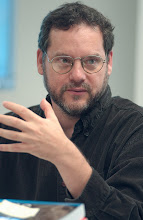Two and a half years ago, there was no real outlet for progressive talk radio anywhere on the local FM dial and absolutely no Keene radio station was affiliated with the
Pacifica Radio Network--the five-decades-old, independent, noncommercial radio network that allows close to 100 affiliated college, community, and public radio stations to broadcast a wide array of well-produced and nationally distributed public affairs programs focused on issues of peace, justice, and sustainablity.
Today, the Keene State College radio station is affiliated with Pacifica and every weekday morning from 8 to 9pm, a growing local audience is able to listen to Pacifica Radio Network’s award-winning news hour,
Democracy Now! with Amy Goodman. On Monday, Tuesday, Thursday, and Friday mornings, volunteer DJ’s from the community also broadcast a total of ten additional hours of public affairs programs from the Pacifica Radio Network on WKNH (which is now live streaming its programs from its website so anyone can
listen online).
These weekly programs include shows on the environmental movement, international women’s news, progressive Christian perspectives on global issues, visions and strategies for community revitalization, gay and lesbian issues, labor union concerns, media criticism, and alternative perspectives on 9/11. Sometimes, these volunteers also find the time to run additional specials, speeches, and radio documentaries from the Pacifica Radio Network during unscheduled blocks of time at the station--such as the two hour radio play written by Vermont author Greg Guma on the history of May Day and the struggle for the 40 hour work week, which WKNH broadcast on May 1st this year.
Besides broadcasting over 15 hours of news and public affairs programs not otherwise available on any local radio station every week, these same WKNH volunteers are also learning to produce their own local segments for broadcast. For starters, some of these broadcasting volunteers have begun reaching out to local nonprofit groups and are helping them make Public Service Announcements to broadcast on WKNH. The local production of PSA’s, commentaries, specials, and perhaps even local weekly news and public affairs shows may be the next wave of this community volunteer effort--as more volunteer DJs are recruited, trained, and become even more sophisticated in radio production techniques.
This community radio initiative all started when members of the Monadnock Freedom Forum approached
EAOP faculty member Abi Abrash-Walton about wanting to expand the diversity of voices, news, and perspectives being broadcast by local radio stations. As director of the EAOP's
Advocacy Clinic, Abi had the group write up a proposal for a clinic project to be undertaken by a student to help make their vision come true. Ellen Hayes was the first clinic student to take on the project and soon began negotiating with WKNH to allow community volunteers to start broadcasting Democracy Now! every weekday morning--which the station started doing in April 2004.
In January 2006, the growing group of trained Democracy Now DJ’s that Ellen has organized was authorized by WKNH to broadcast additional Pacifica programs on Mondays, Thursdays, and Fridays right after Democracy Now. This summer, additional Pacifica programming has also recently also been extended to Tuesday mornings and the station has agreed to create a permenant WKNH Pacifica Programming Committee, which now includes Ellen, Abi, and myself, as well as several others from Antioch New England and the local community.
Today, the committee has four certified regular DJs, five certified subs, and three community trainees. We also have over a dozen local organizations and businesses that serve as underwriters, one major individual donor, and a slew of other local folks who contribute anywhere from $5 to $100 a year to support this effort in progressive community radio. Each semester since the first Pacifica broadcast on WKNH, the Environmental Advocacy and Organizing Program's Advocacy Clinic has also offered at least one student the opportunity to take on specific responsibilities for moving this alternative media project forward.
If you are interested in progressive community radio, your passion will be supported at Antioch's Environmental Advocacy and Organizing Program.
